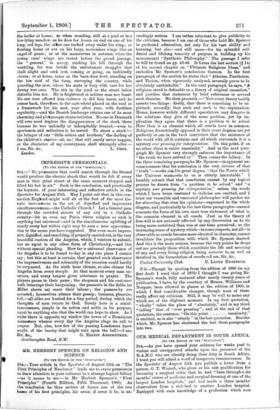MR. HERBERT SPENCER ON RELIGION AND SCIENCE.
[To THE EDITOR OF TUB "SPECTATOR."] Sin,—Your article in the Spectator of August 25th on "The First Principles of Nescience " leads me to crave permission to draw attention in your columns to a strange logical fallacy —as it seems to me — in Mr. Herbert Spencer's "First Principles" (Fourth Edition, Fifth Thousand, 1880). As the conclusion he thus arrives at forma one of the two bases of his first principles, his error, if error it be, is ex- ceedingly serious. I am rather reluctant to give publicity to the criticism, because I am one of those who hold Mr. Spencer in profound admiration, not only for his vast ability and learning, but also—and still more—for his splendid self- denial and lifelong tenacity of purpose in building up his monumental Synthetic Philosophy." The passage I refer to will be found on pp. 43-46. It forms the last section (§ 14) of his second chapter on "Ultimate Religious Ideas," and embodies Mr. Spencer's conclusions thereon. In the first paragraph of the section he states that "Atheism, Pantheism, and Theism, when rigorously analysed, severally prove to be absolutely unthinkable." In the next paragraph he says, "A religious creed is definable as a theory of original causation," and justifies that statement by brief references to several such theories. He then proceeds:—" Now every theory tacitly asserts two things : firstly, that there is something to be ex- plained ; secondly, that such and such is the explanation. Hence, however widely different speculators may disagree in the solutions they give of the same problem, yet by im- plication they agree that there is a problem to be solved. Here then is an dement which all creeds have in common. Religions diametrically opposed in their overt dogmas are yet perfectly at one in the tacit conviction that the existence of the world with all it contains and all which surrounds it is a mystery ever pressing for interpretation. On this point, if on no other, there is entire unanimity." And in the next para- graph Mr. Spencer very strongly enforces the importance of "the truth we have arrived at." Then comes the fallacy. In the three remaining paragraphs Mr. Spencer—in apparent un- consciousness that his conclusion is the very reverse of that "truth "—works out bis great dogma, "that the Power which the Universe mamiests to us is utterly inscrutable." I humbly submit that that conclusion cannot by any logical process be drawn from "a problem to be solved," and "a mystery ever pressing for interpretation," unless the words which I have twice ventured to italicise are omitted, and I trust our venerable and venerated philosopher will pardon me for observing that even his opinions—expressed in the whole chapter, and partictilarly in the last three paragraphs—cannot evacuate the force of his own most true statement of what is the common element in all creeds. Just as the theory of free-will is not seriously affected by any discoveries as to its being more restricted than was at one time perceived; so the increasing sense of mystery which—in some respects, not all=ie observable as creeds become more elevated in character, cannot invalidate the proposition with which Mr. Spencer started. And this is the more serious, because the very points he drops out are precisely those which constitute the life and meaning of any and every living religion, being anterior to, as well as involved in, the formulation of creeds.—I am, Sir, &c.,
P.5.—Though by quoting from the edition of 1880 (in my first draft I used that of 1870) I thought I was giving Mr. Spencer's words, fully matured after nearly twenty years of publication, I have, by the courtesy of Messrs. Williams and Norgate, been allowed to glance at the edition of 1900, in which I find considerable changes, though none of them really affect my criticism. Still, it may be well to name any which are of the slightest moment. In my first quotation, " wholly " takes the place of "absolutely," and in my third " calling " that of "ever pressing " ; and at the end of that quotation, the sentence, "On this point unanimity," is omitted, as is also " utterly " in the last quotation. Besides which, Mr. Spencer has shortened the last three paragraphs into two.


































 Previous page
Previous page